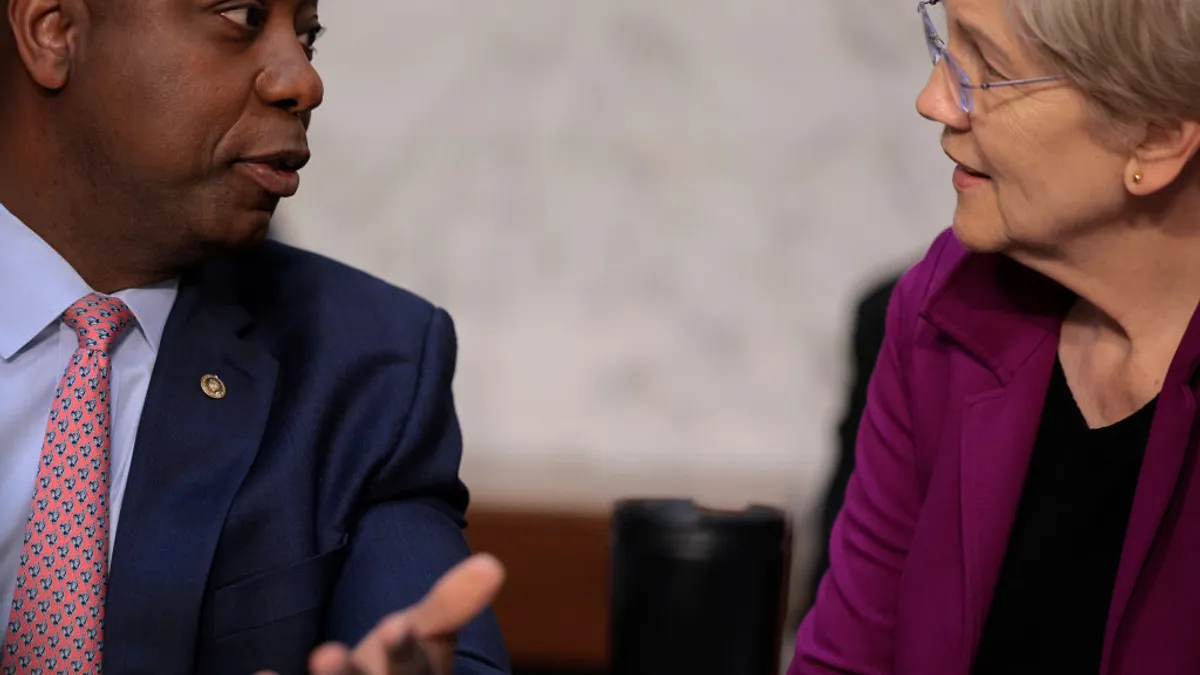The Senate Banking Committee’s version of the “One Big, Beautiful Bill” would cut off the funding pipeline between the Federal Reserve and the Consumer Financial Protection Bureau, according to text made public Friday.
Under current stipulations, the CFPB can receive funds of up to 12% of the Fed’s inflation-adjusted profits in 2009. The Senate Banking Committee’s proposed legislation would bring that percentage to 0% and force the CFPB to get its annual funding through congressional appropriations.
That mirrors a core argument of plaintiffs who tried, in a long-running legal battle, to convince courts that the CFPB’s funding source was unconstitutional because the bureau’s money came from the Fed and not Congress. The Supreme Court ruled in the CFPB’s favor in 2024.
Sen. Elizabeth Warren, D-MA, and presumably other Democrats, are arguing Friday’s version of the bill would run afoul of the Byrd rule, which prohibits "extraneous" items from being added to the budget reconciliation process.
Warren noted, too, that the Senate Banking Committee’s proposal marks more drastic cuts than a House Financial Services Committee version that would have capped the CFPB’s funding at 5% of the Fed’s total operating budget from 2009.
“This bill goes beyond the already extreme House bill and is yet another example of Republicans’ reckless and bloodthirsty pursuit of destroying the CFPB … by any means necessary, after failing to get their way in court,” Warren, the committee’s ranking member, said in a statement Friday.
That court reference is a nod to a handful of lawsuits filed against the Trump-era CFPB – most notably by the workers’ union covering the bureau’s employees. The district judge in that case halted the CFPB from firing up to 95% of its workforce. Another case, brought by the city of Baltimore, kept the CFPB from voluntarily returning unappropriated funding to the Fed.
“Congress has a mandate to deliver President Trump’s agenda for the American people – and that means streamlining the federal bureaucracy, cutting red tape and saving taxpayer dollars,” Sen. Tim Scott, R-SC, the Senate Banking Committee chair, said of Friday’s version of the bill.
Apart from its targeting the CFPB, the bill would cut pay for non-monetary policy employees at the Fed to align them with Treasury Department employees – and put their new pay scale at 70% of pay at the Federal Deposit Insurance Corp.
The bill would also wind down the Office of Financial Research, which the Senate Banking Committee Republicans called “duplicative.” Members of the Financial Stability Oversight Council already have economic or research functions, bill proponents argued. Eliminating the office would save taxpayer dollars and wouldn’t affect the FSOC’s ability to review economic data. Warren, however, accused Republicans of trying to “destroy” the FSOC.
Another facet of the bill that touches the CFPB is a provision that would postpone until 2034 the requirement that lenders originating 100 or more small-business loans per year must collect race, gender, LGBTQ status and demographic data about their borrowers. The CFPB said last month it would not enforce the rule, which goes into effect in July for the most prolific lenders.
The bill also eliminates a fund the Securities and Exchange Commission uses to finance technology modernization.
Warren, for her part, blasted the bill, saying it “guts” regulators apart from the CFPB “that help keep our financial system safe.”
“This will not stand — and don’t just take it from me, take it from the litany of Senate Republicans who are on the record saying this violates Senate rules,” she said. “Democrats will fight this attack on American consumers.”
Scott, however, argued the bill “takes important steps to reduce waste and duplication in financial regulation while bolstering our national security.”
The bill puts $1 billion into a fund toward the Defense Production Act.












